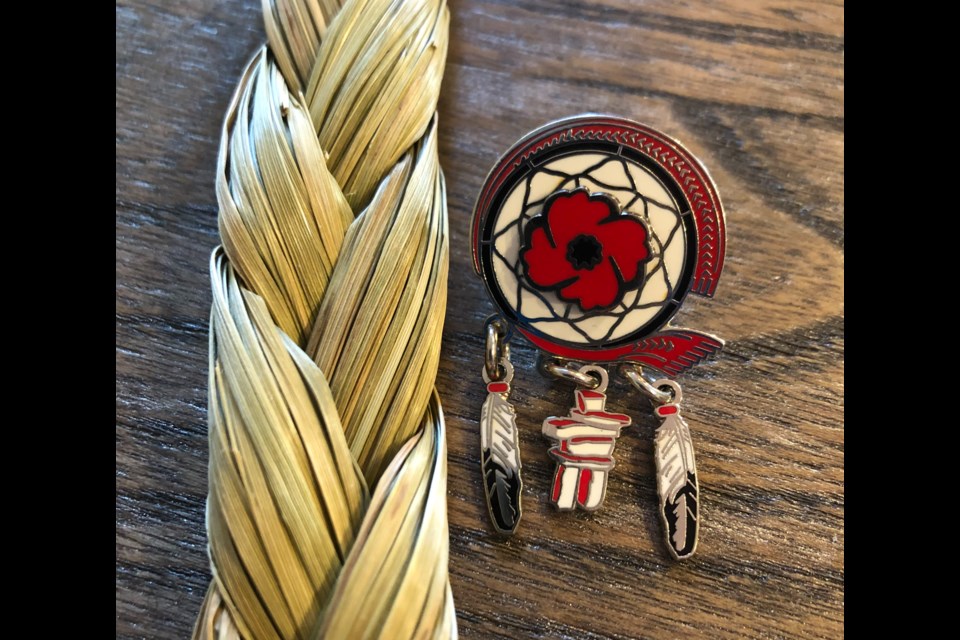BONNYVILLE – Leading up to this year’s Remembrance Day ceremonies, the Royal Canadian Legion has unveiled a new commemorative lapel pin to recognize and bring awareness to the sacrifices made by Indigenous soldiers throughout Canada’s history.
In a statement addressing the commemorative pin, The Royal Canadian Legion wrote, “(We have) chosen to recognize Canada’s Aboriginal Veterans and the significant contribution they have made through our long history and that they continue to make today. This commemorative pin presents the Legion Poppy on the centre of a dreamcatcher, their coupling acknowledging the efforts and sacrifices of veterans from all of our Aboriginal Communities.”
Elaborating on the contribution and sacrifice that Indigenous soldiers have made, the Legion continued, “Aboriginal Veterans have served both in Canada's military forces and as allies, from the formative times of the War of 1812 to the present. Their military contributions were essential to Canada’s survival in earlier times. The Royal Canadian Legion honours today’s Aboriginal veterans and their ancestors.”
Duane Zaraska, the president of Métis Region 2 and an associate member of the Royal Candian Legion Branch 183, takes pride in the new and inclusive pin honouring First Nations, Inuit and Métis veterans.
Both Zaraska’s father and grandfather served in the Canadian Armed Forces.
“Indigenous peoples have volunteered to fight shoulder to shoulder with our Canadian soldiers. In all three wars, WWI, WWII and in the Korean War... people have to realize that they were remarkable soldiers,” he said.
“They came from communities where hunting was a cornerstone of daily life. So, they have the patience, the stealth, they have the marksmanship. They made great snipers, they were great scouts and so they would have contributed significantly in that regard.”
According to research carried out by Dr. Scott Sheffield, whose career has been dedicated to uncovering historical contributions of Indigenous communities to the Second World War in Canada, “when Canada marched to war in 1914 and 1939, First Nations people joined the national efforts and volunteered for the military. In fact, more than 4,000 Status Indian men enlisted in each World War, the majority as volunteers.”
In his book, Canadian History: Post-Confederation, Sheffield explained, “After both wars, Status Indian veterans faced unequal access to benefits and programs provided to help veterans re-establish themselves in civilian life.”
The reality of how Indigenous people were treated and the lengths they went to serve in both World Wars is why Zaraska believes these men deserve recognition.
“Even getting there. I mean, imagine the challenges that they had to face even getting to Cumberland House to enlist... They didn't have transportation or money to get there, but they were so passionate and dedicated to the country and helping out that they did it – so that alone is remarkable.”
Zaraska also pointed out additional challenges Indigenous men faced once they joined the military. Men faced cultural barriers, which were significant as well as language barriers, “most of them were Cree speaking, and yet they still went.”
A pin of symbolism
The commemorative Aboriginal veteran's pin has several unique features, each with an intended significance.
“There are three Indigenous groups of people in Canada, being First Nations, the Inuit and the Métis, and that's exactly what we have put into the commemorative pin,” explained Zaraska.
Featured as the back drop for the poppy is a dreamcatcher, which has become commonly recognized as an Indigenous symbol.
Hanging from the bottom of the pin are two feathers and between them hangs an Inukshuk, “which is the symbol for the Inuit people, and then around the dreamcatcher, they’ve incorporated a (Métis) sash right around the whole outside of the dream catcher,” he said.
Zaraska added, the new pin “is more inclusive of all Indigenous groups because as Métis people, especially, we always get lumped in with the First Nations people. And we're not First Nations, we're very unique, we have a unique culture and that's what makes us a Peoples. We always struggle for recognition... so having that sash there is very important for us.”
For those interested in picking up a commemorative Aboriginal Veteran’s poppy pin, they are being sold by the Bonnyville Legion, the Bonnyville Métis Region 2 office and by Zaraska directly for $7.50.
All the proceeds from the pin goes to the Canadian poppy fund.



